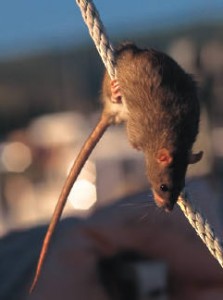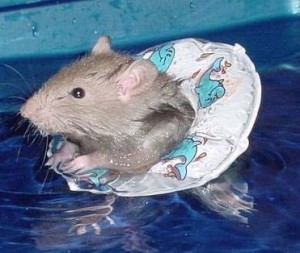Ghost Ship or Not, How to Say ‘Rats’ in Irish Posted by róislín on Jan 23, 2014 in Irish Language
(le Róislín)
Cannibal rats? A ghost ship? An Irish island? How dramatic is that?
You’ve probably read the basic news scoop by now. The cruise ship Lyubov Orlova, built in 1976 in the former Yugoslavia, is allegedly adrift in the North Atlantic, with no crew. The only living (if that) inhabitants on board are believed to be rats, and with no remaining food on board, the assumption is that they would turn to … well … each other.
I find it hard to believe that this ship is really going to reach an Irish island, crash, and discharge hundreds or thousands of rats. But it’s a great opportunity to look at some Irish vocabulary, such as rats, ships, ghosts, and ghost ships. So here goes:
1) rats: there are several choices for “rat”: francach, luchog mhór (or “luch mhór“), and luch fhrancach. I favor “francach,” mainly because it’s a single word and less complex to combine in phrases like cangarú francaigh, dreancaid fhrancaigh, francach camra, francach dubh, and francach saotharlainne (aistriúcháin thíos). And then there’s the “francach uisce bréige,” which is the “false water-rat.” “False water-rat”? Hmmm, if water-rats, like The Wind in the Willows‘ “Ratty,” aren’t really rats (is vól é Ratty), then what’s a “false water-rat” — mh’anam, ábhar blag eile is dócha! Another reason that I favor “francach” is that “luchog mhór” and “luch mhór” can also mean “large mouse.” Cé chomh mór? Níl a fhios agam. Chomh mór le Reepicheep? Á, ní dóigh liom é!
Here are the main forms of “francach”
an francach, the rat (NB: with an upper-case “F,” as “Francach,” the word would mean “Frenchman,” ach sin ábhar eile ar fad)
an fhrancaigh [un RAHN-kee OR un RAHN-kig] of the rat; dath an fhrancaigh, the color of the rat
na francaigh, the rats
na bhfrancach [nuh VRAHN-kukh], of the rats, cinniúint na bhfrancach, the fate of the rats
And for the other possibilities:
an luchóg mhór, the rat (or “the big mouse”), na luchóga móra, the rats
an luch mhór, the rat (or “the big mouse”), na lucha móra, the rats
an luch fhrancach, the rat, na lucha francacha, the rats
A “rat” as a person (a “snitch”) is a completely different word, “loiceach.”
And “rat-catcher” does take us back to the “luch” root: luchaire, pl. luchairí. And there’s also “francaire,” pl. francairí.
As for “ratatouille,” well, the 2007 Disney movie pun (with the main character, Remy, being a rat) wouldn’t exactly work in Irish, which is no surprise, since word play does not usually translate from language to language. But if you’re interested the Irish version of the word for the stewed vegetable dish, it’s “ratatúí.” It’s interesting to note that this is a relatively unusual instance in Irish of two long vowels in a row, telling us that both vowels are pronounced (rah-tah-too-ee), unlike “buí” [bwee] or “fiú” [fyoo].
2) ship: this is one of the first words usually learned in Irish, so this may well be review:
an long, the ship
na loinge, of the ship
na longa, the ships
na long, of the ships
Needless to say, there are dozens of types of ships, but we might just note the following here, since it pertains to the Lyubov Orlova:
an chrúslong, the cruise liner, na crúslonga, the cruise liners
3) ghost: another enormous topic, but the basics are:
an taibhse [un TYV-shuh, with the “y” like “my” or “eye”], the ghost
na taibhse, of the ghost
na taibhsí, the ghosts
na dtaibhsí [nuh DYV-shee], of the ghosts
4) ghost ship: there are several possibilities here but none that I have seen traditionally use the word “taibhse” as such
long sí, ghost ship, phantom ship, lit. a fairy ship, probably understood here more as a “supernatural ship”
long mhaol, ghost ship, lit. a “bare” (bald) ship; this phrase also means a “hulk.” “Maol” is one of those fascinating words with about a dozen meanings (beardless, hornless, unprotected, cropped, bobtailed, edgeless, dense, obtuse, etc., etc.) all of which could be ábhar blag eile.
I have found only one example online of “long thaibhsí” (lit. ship of ghosts). It was on a recent translation of a Sponge-Bob Square-Pants online game but that doesn’t set much precedent for the use of the word traditionally.
I suppose all of this raises the question of what exactly is a “ghost ship”? A real ship that’s been abandoned? A ship crewed by ghosts? A phantom ship that can only be seen under certain conditions (anniversary of its sinking, etc.). But the finer points of “ghost-shipness” don’t seem to have concerned the authors of the 2 million or so references to the Lyubov Orlova online. As I write this though, I’m getting intrigued about how to say “ghost ship” in other languages. Is it literally “ghost,” or “phantom,” or simply “derelict” or “abandoned” or some such straightforward term? Is it a Flying Dutchman or is it a Mary Celeste? But that topic is getting far beyond today’s Irish Blog.
It’s all rather eerie though, and somehow puts me in mind of “I Saw a Ship a-Sailing,” with its unusual crew:
The four-and-twenty sailors, That stood between the decks,
Were four-and-twenty white mice, With chains around their necks
But that ship is captained by a duck (!) and safely within the realm of the fantastic, the “neamhshaolta,” and actually has a happy outcome, since this nursery-rhyme ship is filled with “comfits” and apples for the recipient/listener.
If the Lyubov Orlova has actually sunk, as many presume, it must have been a grisly end for any rats on board. Traditionally, rats are supposed to abandon a sinking ship but my image of this has always been that the rats leave before the ship sets sail and return to the wharves and docks to find a more seaworthy vessel. Much as I do not wish to encounter a starving plague-infested rat, I can only imagine the final scenario if this ship really was swarming with rats and it would be pathetic. I wonder how far (or if) rats can swim, but even if they can a bit, I doubt they’d get very far in uiscí fuara an Atlantaigh Thuaidh.
Scéal aisteach, uaigneach, neamhshaolta é a chuireann chun smaointe muid. Especially since the whole business started because of the issue of profitability and the feasibility of recycling the ship for “miotal conamair” (scrap metal).
An nuacht is nuaí fúthu? – Róislín
Nóta: cineálacha francach: cangarú francaigh (kangaroo rat), francach camra (sewer rat), francach dubh (black rat), agus francach saotharlainne (laboratory rat) agus “f(h)rancaigh” mar aidiacht: dreancaid fhrancaigh (rat flea)
Agus mar fhocal scoir:

Build vocabulary, practice pronunciation, and more with Transparent Language Online. Available anytime, anywhere, on any device.






Leave a comment: